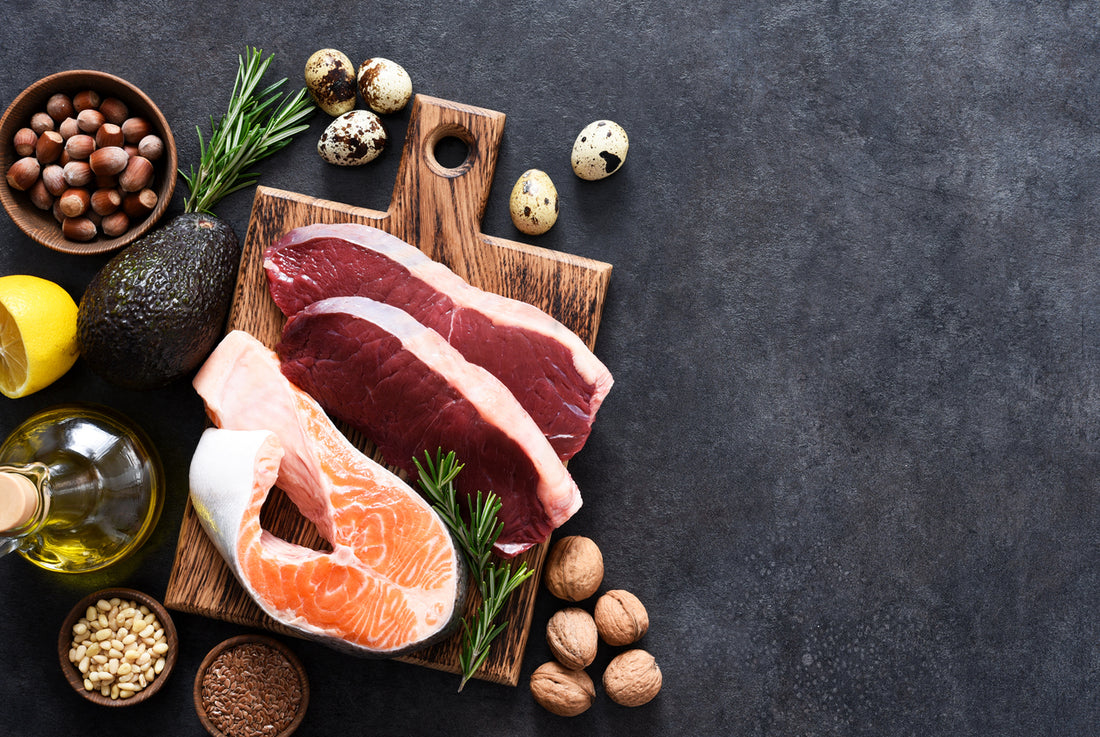
Unlocking the Health Benefits of Vitamin B12 with Grass-Fed Beef
Vitamin B12 is an essential nutrient that plays a key role in many of our body’s metabolic processes, from energy production to red blood cell formation. Unfortunately, many people do not get enough Vitamin B12 from their diets, leading to deficiencies that can have serious health consequences.
Grass-fed beef - A vitamin B12 powerhouse
Fortunately, grass-fed beef is an excellent source of bioavailable Vitamin B12 and is an excellent choice for making sure you get enough of this important vitamin along with numerous other essential vitamins and fatty acids/
Natural sources are better
In this article we will discuss why it is important to consume natural sources of Vitamin B12 such as grass-fed beef, dairy, eggs and fish as opposed to vitamin supplements in order to make sure that the body is receiving enough bioavailable forms of the vitamin.
What Is Vitamin B12?
Vitamin B12 is a water-soluble vitamin that plays an important role in many bodily processes related to energy production, cognitive function, nerve health and more. It also helps your body form red blood cells to carry oxygen around the body. Unfortunately, many people don't get enough Vitamin B12 from their diet, and deficiency can lead to various health issues such as fatigue, cognitive problems and anemia.
What does vitamin B12 do for the body?
Research shows that getting enough bioavailable Vitamin B12 can provide a range of health benefits, including:
- Boosting energy levels by helping your body convert food into fuel
- Supporting nerve health and helping to maintain a healthy nervous system
- Aiding in red blood cell formation, so your body can make enough oxygen-carrying cells
- Helping with memory and cognitive function
What foods contain vitamin B12?
Vitamin B12 occurs naturally in certain foods such as meat, fish, eggs and dairy products. these food sources of Vitamin B12 are incredibly rich and bioavailable sources, meaning the body can use them very easily
What happens if your vitamin B12 is low?
Vitamin B12 is an essential nutrient for human health. It plays a key role in many bodily functions, including energy production, nerve function, red blood cell formation and more.
What are the symptoms of lacking vitamin B12?
Unfortunately, Vitamin B12 deficiency is quite common among adults due to inadequate dietary intake or impaired absorption of the vitamin. symptoms of low vitamin B12 can include tiredness, fatigue, visual disturbances, pins and needles and mouth ulcers.
Vitamin B12 Recommended Intakes
The recommended dietary intake of vitamin B12 is 2 mg. Statistical analyses shows that people with low social status, women, and specific ethnic minorities tend to consume a lower amount of vitamin B12 compared to their peers.
Vitamin B12 or folate deficiency anaemia
Vitamin deficiency anaemia is when the liver produces excessive blood, producing red blood cells without sufficient nutrients. Red blood cells carry oxygen in a fluid called "hemoglobin". Anaemia generally refers to the presence of either lower levels of red blood cells than normal or abnormally low levels of hemoglobin.
Vitamin B12 Deficiency
Some factors contributing to vitamin deficiency are dietary choices (plant based diets low in animal products), difficulty absorbing the vitamin B12, prolonged use of certain medications (eg, metformin or phentermin).
Vitamin B12 and cognitive function
Additional research has shown that getting enough Vitamin B12 from natural sources, can help reduce the risk of cognitive decline and other age-related health issues.
Supplementing with vitamin B12
Vitamin supplements are not always easily absorbed by the body and may cause adverse side effects in some individuals. For this reason natural sources of Vitamin B12 are encouraged, and generally better tolerated.
Are natural sources of B12 better than supplements?
Natural animal food sources of vitamin B12 are not only more bioavailable, they also provide additional health benefits due to the presence of other essential nutrients such as omega-3 fatty acids, CLA, antioxidants and protein.
How can I increase my B12 naturally?
By consuming a diet rich in bioavailable Vitamin B12 from animal foods such as dairy products, eggs, fish and grass-fed beef, you can support your overall health and help ensure your body gets the essential nutrients it needs.
Why Is Grass-Fed Beef a Good Source of Bioavailable Vitamin B12?
Grass-fed beef is an excellent source of bioavailable Vitamin B12, which means it's easily absorbed and utilized by the body. It contains higher levels of Vitamin B12 than grain-fed beef due to the cows' natural diet of grasses and other plants. Grass-fed beef also provides additional health benefits such as omega-3 fatty acids, conjugated linoleic acid (CLA) and antioxidant vitamins.
Animal food sources
By consuming a diet rich in bioavailable Vitamin B12 from animal foods such as dairy products, eggs, fish and grass-fed beef, you can support your overall health and help ensure your body gets the essential nutrients it needs. With its numerous health benefits, grass-fed beef is an excellent choice for making sure you get enough of this important vitamin.
Conclusion
In conclusion, Vitamin B12 is an essential nutrient for optimal health and well-being. It helps to boost energy levels, promote a healthy nervous system and aid in red blood cell formation. Natural sources of Vitamin B12 are the best way to get enough of this important vitamin because they provide bioavailable forms that can be easily absorbed by the body without causing adverse side effects. Grass-fed beef is one such natural source that provides high quality protein along with other beneficial nutrients like omega-3 fatty acids, CLA and antioxidants. By incorporating grass-fed beef into your diet on a regular basis you can ensure that you’re getting all the important benefits of bioavailable Vitamin B12 while also supporting overall good health and reducing the risk of cognitive decline.